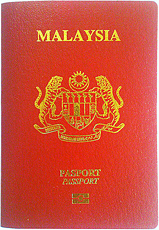
FOR the first time, all eligible Malaysians abroad may be able to vote by post. This follows an 11 July 2012 Election Commission (EC) announcement that legislative changes are being prepared towards this end. The only condition is that voters must return to Malaysia at least once in five years before the elections. This will be welcome news to the approximately one million Malaysians working and living overseas.
But should these Malaysians be entitled to vote? And will this affect the outcome of the next general election? The Nut Graph asks political scientist and Bersih 2.0 steering committee member Dr Wong Chin Huat.
TNG: Why should Malaysians overseas be entitled to vote in general elections?
Overseas Malaysians are entitled to vote in general elections because they are Malaysians. Period. All Malaysians above 21 years, who are of sound mind and not disqualified by criminal conviction, are allowed to vote. Where Malaysians live does not affect their right to vote. It may pose logistical challenges to universal suffrage but it does not invalidate the right to vote.
The suggestion that only those who have been home at least once in five years shows either the EC’s ignorance or insincerity in expanding overseas votes. Article 119 of the Federal Constitution provides no ground to exclude any voters by location. This makes the Elections (Registration of Electors) Regulations and Elections (Postal Voting) Regulations potentially unconstitutional. These by-laws restrict the overseas voting right to civil servants, tertiary students and their spouses. These by-laws are being challenged in court by six voters representing MyOverseasVote. Their challenge was rejected by the High Court but they are appealing the decision.
The suggestion to allow only those who have returned in the past five years to vote delays the right of all Malaysians to vote. It also creates confusion and contention. Agreeing to it means legitimising the current disenfranchisement of overseas voters.
But there are some who say Malaysians abroad should be treated differently, especially if they have settled in another country.
Granted, the EC is not the only party who proposes to restrict overseas voting. For example, Bakri Musa, a California-based surgeon who writes extensively on Malaysian affairs, opposes voting rights for Malaysians who are permanent residents of other countries. He does so on three grounds: (a) absence means these voters do not have to bear the consequences of their choice; (b) they don’t pay tax and are therefore seeking representation without taxation; and (c) there are considerable added costs in facilitating the overseas vote.
The last point of objection is rather weak because the bulk of the cost in administrating overseas votes is in the establishment of the mechanism. The marginal cost for any additional voter is low. In other words, if you decide to open a voting centre in Berlin, running it for 500 Malaysians or 5,000 Malaysians may not make much difference in cost. One can of course go into details on how to minimise the cost.
The objections worthy of consideration are the first two, which may be summed up as one question: Are permanently overseas Malaysians still stakeholders in Malaysia’s future? One can take either the positive or negative position but one must not be inconsistent, let alone hypocritical.

If we think that permanently overseas Malaysians cease to be truly Malaysians, then we should not hope for remittance, tourism revenue, investment, trade and transfer of technology from them more than from other foreigners. In that case, barring overseas Malaysians to vote is the right signal. We’re saying, “Why do you bother holding on to your Malaysian passport if you continue staying overseas? You either come back or you cease to be one of us.” However, if we hope to draw in funds, technology, knowledge and network through overseas Malaysians, then on what grounds can we bring ourselves to tell them, “You should help your country of origin, but sorry, this country is no longer yours!”
Really, we should make up our minds. One thing for sure, overseas Malaysians definitely are not dumb enough to be milked and discriminated against at the same time.
Speculation is that many overseas Malaysians would be critical of the Barisan Nasional (BN) government. Why would the BN government risk allowing the EC to introduce the postal vote for overseas Malaysians?
It would not be wrong to say a majority of overseas Malaysians left the country because they disagreed with the government’s policies. Naturally, they are more likely to vote against than for the BN.
Should the BN government then risk allowing the EC to expand postal vote for overseas Malaysians? Yes, if they really believe in changing this country. By committing to democracy, they can show overseas voters that they have changed and can be trusted. Such a positive attitude would at least make overseas voters less compelled to vote out the BN.

Curtailing overseas votes in fact provokes overseas Malaysians who have the resources to fight back. They have now launched the “Jom Balik Undi” campaign, encouraging overseas Malaysians to come home to vote. The diaspora in a few cities is even contemplating the idea of chartering flights back during elections, as a response to the EC’s hostility against universal overseas franchise.
There have been concerns over abuse of postal votes. Can we trust that the process will be fair and transparent? What safeguards should be put in place to ensure this doesn’t occur with overseas postal votes?
The fundamental problem with postal votes is that ballots are cast without being scrutinised by party agents or independent observers. This means, the votes may be tampered with or cast under intimidation. For closed and hierarchical environments like military barracks and police stations, this is especially problematic.

Systematic rigging of overseas postal voters is less likely to happen in thousands of individual homes. However, tampering may take place at the counting stage if independent observers and party agents are not allowed to be present to scrutinise the entire process. It may also be undermined in the standard way — by having a very short campaign period and sending the ballots out only a few days before polling so that only a few can send back the ballots in time.
The best safeguard against tampering is this: involve the public and civil society groups working on elections, like Bersih 2.0, in the planning. Transparency is really the best insurance.
Assuming the changes are made before the next general election, how will allowing Malaysians overseas to vote affect the results of the next general election? How big an impact will it make? Will many overseas Malaysians bother to cast their votes?
Whether or not postal votes will be allowed, overseas Malaysians will make a strong impact in the coming elections. It is a matter of how, not whether. If postal votes are denied, a smaller number of overseas voters will mobilise to return home to vote. Every one of those angry voters will likely lobby their friends and families to vote against the BN.
If postal votes are allowed, the overseas voters who cast their vote would come from a wider spectrum and the BN may hope to win some support, although it may not win a majority amongst this constituency.
Will many overseas Malaysians care to vote? Well, if anything, the BN and EC’s hostile response has awakened many overseas Malaysians, at least by drawing them into the global protests of Bersih 2.0 and 3.0. Expect more backlash if the EC’s promise to expand overseas votes turns out to be a fiasco like the Orwellian Peaceful Assembly Act in Najib’s so-called Political Transformation Programme. ![]()
Political scientist Wong Chin Huat is a Bersih 2.0 steering committee member. He is also a political scientist by training and a journalism lecturer by trade. If readers have questions and issues they would like Wong to respond to, they are welcome to e-mail editor@thenutgraph.com for our consideration.


JW Tan says
I find the EC’s recent announcements, stating that few overseas Malaysians have registered to vote, and implying that this whole process is a waste of time, to miss the point entirely.
The point is that they cannot disenfranchise a whole segment of voters by imposing requirements beyond identity checks. End of story. Any other complaint is moot, and potentially violates the constitution if used as an excuse to exclude anyone from voting.
Gopal Raj Kumar says
Wong Chin Huat raises a feeble and purile argument devoid of any substance in support of his contention that Malaysians abroad properly denied the right to vote in Malaysian parliamentary elections are being treated unfairly.
The federal constitution (of Malaysia) is clear and unequivocal on the point. Article 119 of the federal constitution provides thus:
“1. Every citizen who has attained the age of twenty-one years on the qualifying date and has been resident in a constituency for at least six months immediately preceding the qualifying date is entitled to vote in that constituency in any election to the House of Representatives or the Legislative Assembly unless he is disqualified under Clause (3) or under any law relating to offences committed in connection with elections, but no person shall in the same election vote in more than one constituency.”
Now which part of Article 199 does Wong not understand?
The above is the principle clause in Article 119 dealing with the subject matter of Wong’s article. It is the relevant clause in Article 119 of the Constitution that determines and spells out a voters entitlement (or right) to vote at parliamentary elections in Malaysia.
Setting aside for the moment the drafting defects in the the document, it is clear that Wong Chin Huat is propagating a political policy statement devoid of any legal or constitutional effect in his attempts at misleading his readers.
Malaysia citizens residing abroad (the majority of whom are not workers abroad as he claims. Many are dual citizens or permanent residents of foreign states) do not have any automatic right to vote in parliamentary elections.
Whatever logic one may proffer in advancing Chin Huat’s proposition or opposing it, the position is clear. Wong fails to make out a case which his master Ambiga Sreenivasan also advances on every rickety platform of a forum on which she is allowed to put her case across.
Gopal Raj Kumar says
The recent return of Waythamoorthy from his self-imposed exile in London is evidence of support for constitutional requirements on the question of the residency requirement imposed on citizens who qualify to vote in section or article 119 of the Federal Constitution of Malaysia.
If as a “wanted man” in Malaysia for his political activities (at least that was his take on the matter till now) Waythamoorthy can take that critical step towards exercising his right in an upcoming general election in Malaysia, so too can those […] who continue to park themselves abroad and demand the right to vote.
There is no constitutional or even a common law “right” for anyone in the position your subject material focuses on (people parked abroad) to vote in the coming general election. […]
Chin Huat says
119. (1) Every citizen who—
(a) has attained the age of twenty-one years on the qualifying date;
(b) is resident in a constituency on such qualifying date or, if not so resident, is **an absent voter**; and
(c) is, under the provisions of any law relating to elections, registered in the electoral roll as an elector in the constituency in which he resides on the qualifying date,is entitled to vote in that constituency in any election to the House of Representatives or the Legislative Assembly unless he is disqualified under Clause (3) or under any law relating to offences committed in connection with
elections; but no person shall in the same election vote in more than one constituency.
……
(4) In this Article—
(a) **“absent voter” means, in relation to any constituency, any citizen who is registered as an absent voter in respect of that constituency;**
(b) “qualifying date” means the date on which a person applies for
registration as an elector in a constituency, or the date on which he applies for the change of his registration as an elector in a different constituency, in accordance with the provisions of any law relating to elections.
The answer to Gopal’s question lies in the part of Article 116 which he conveniently omitted (marked with **). I admire his boldness to believe that others cannot get hold of a copy of the Federal Constitution.
I rest my case.
Gopal Raj Kumar says
Again you fail to deliver the goods. You have identified the qualification for a voter. Where does it say “absent voter” meaning someone who is able to vote outside of a geographical area which is part of his constituency in which “he resides”?
Notice how Article (4) as quoted above provides “absent voter” as meaning in relation to a constituency, any citizen (does this mean that could include a citizen of Indonesia or China?); these are typical of the examples of the drafting defects found in all Malaysian laws. Putting that issue aside, where does it say an absent voter is an absentee voter and that either have the right to vote in their absence from their constituency especially when outside the borders of Malaysia?
More importantly, where does it say in my previous posting that I had assumed that no one else had access or would be able to access a copy of the Federal Constitution of Malaysia? And quite apart from all of the above, where does the constitution as you now claim to be the case, permit an absentee or absent voter from exercising his right to vote outside of the constituency in which he is otherwise registered?
As it stands WC Huat, the point you try to make is against you in the constitution. Perhaps the point you wish to make and what you say here are at cross purposes.
You perhaps wish to suggest that people otherwise with a right to vote should be allowed to vote even when absent from their constituency (meaning abroad). For that you must identify the relevant provisions in the constitution that would allow for such an exemption from the relevant provisions of the constitution or some other corresponding legislation right or rule.
Perhaps you now understand why I omitted the other articles you now quote in the constitution in my response. They are irrelevant when making the point we disagree on.
ALT says
I just stumbled upon this post and this comments section. I must say, Gopal, your arguments are particularly tenuous.
The writer is right to point out the qualification re: “absent voters”. Based solely on the writer’s response (which you disagree with), the definition of “absent voter” is not by reference to geography per se (although practically, you’d expect the person to be physically absent!) but by reference to the registered status of the voter as is clear from the wording of Article 4 quoted above. As (and as you also say!) there is no reference to geographical location, there is no difference between a person working in KL but is registered to vote in Penang and a person living in Singapore but is also registered to vote in Penang. Both are “absent voters”.
On a side point, “citizen” within the context of the constitution is clear. Devoid of context, there will be uncertainty as to whom the text is referring to. But here, there is a clear context. If you refuse to accept this argument, you will have to concede that we are all speaking nonsense because when you say “you” in your post above, we can all ask “to whom is he talking to? I do not understand”, ignoring the fact that you are responding to the writer and where you are posting.